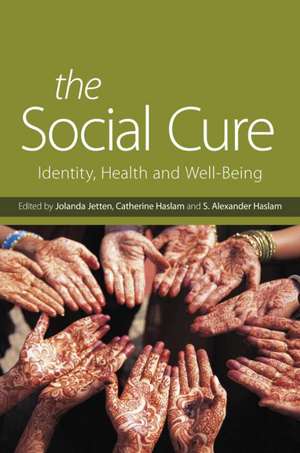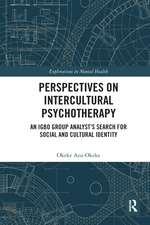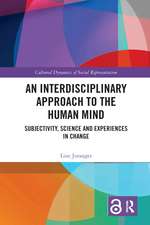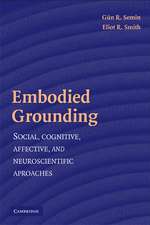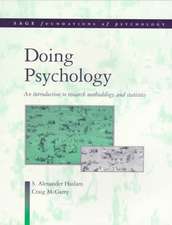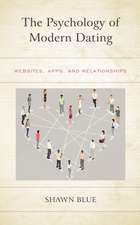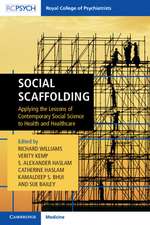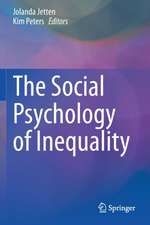The Social Cure: Identity, Health and Well-Being
Editat de Jolanda Jetten, Catherine Haslam, S. Alexander Haslamen Limba Engleză Hardback – 8 iul 2011
This edited book brings together the latest research on how group memberships, and the social identities associated with them, determine people’s health and well-being. The volume provides a variety of perspectives from clinical, social, organisational, and applied fields that offer theoretical and empirical insights into these processes and their consequences. The contributions present a rich and novel analysis of core theoretical issues relating to the ways in which social identities, and factors associated with them (such as social support and a sense of community), can bolster individuals’ sense of self and contribute to physical and mental health. In this way it is shown how social identities constitute a ‘social cure’, capable of promoting adjustment, coping, and well-being for individuals dealing with a range of illnesses, injuries, trauma and stressors. In addition, these theories provide a platform for practical strategies that can maintain and enhance well-being, particularly among vulnerable populations.
Contributors to the book are at the forefront of these developments and the book’s strength derives from its analysis of factors that shape the health and well-being of a broad range of groups. It presents powerful insights which have important implications for health, clinical, social, and organisational psychology and a range of cognate fields.
| Toate formatele și edițiile | Preț | Express |
|---|---|---|
| Paperback (1) | 362.42 lei 6-8 săpt. | |
| Taylor & Francis – 10 sep 2015 | 362.42 lei 6-8 săpt. | |
| Hardback (1) | 1010.53 lei 6-8 săpt. | |
| Taylor & Francis – 8 iul 2011 | 1010.53 lei 6-8 săpt. |
Preț: 1010.53 lei
Preț vechi: 1232.35 lei
-18% Nou
Puncte Express: 1516
Preț estimativ în valută:
193.36€ • 201.49$ • 160.11£
193.36€ • 201.49$ • 160.11£
Carte tipărită la comandă
Livrare economică 03-17 aprilie
Preluare comenzi: 021 569.72.76
Specificații
ISBN-13: 9781848720213
ISBN-10: 1848720211
Pagini: 408
Ilustrații: 26 black & white tables, 1 black & white halftones, 22 black & white line drawings
Dimensiuni: 156 x 234 x 28 mm
Greutate: 0.75 kg
Ediția:1
Editura: Taylor & Francis
Colecția Psychology Press
Locul publicării:Oxford, United Kingdom
ISBN-10: 1848720211
Pagini: 408
Ilustrații: 26 black & white tables, 1 black & white halftones, 22 black & white line drawings
Dimensiuni: 156 x 234 x 28 mm
Greutate: 0.75 kg
Ediția:1
Editura: Taylor & Francis
Colecția Psychology Press
Locul publicării:Oxford, United Kingdom
Cuprins
Part I: Social Identity, Health and Well-Being . Jetten, Haslam, S. A. Haslam, The Case for a Social Identity Analysis of Health and Well-Being. Sani, Group Identification, Social Relationships and Health. Tarrant, Hagger, Farrow, Promoting Positive Orientation Towards Health Through Social Identity. Helliwell, C. Barrington-Leigh, How Much is Social Capital Worth? Part II: Social Identity, Stigma and Coping. St Claire, Clucas, In Sickness and in Health: Influences of Social Categorizations on Health-related Outcomes. Jetten, Pachana, Not Wanting to Grow Old: Using a Social Identity Model of Identity Change (SIMIC) to Understand the Impact of Driving Cessation in Older Adults. Branscombe, Fernández, Gómez, Cronin, Moving Toward or Away from a Group Identity: Different Strategies for Coping with Pervasive Discrimination. Matheson, Anisman, Biological and Psychosocial Responses to Discrimination. Part III: Social Identity, Stress and Trauma. Haslam, Reicher, Levine, When Other People Are Heaven, When Other People Are Hell: How Social Identity Determines the Nature and Impact of Social Support. van Dick, Haslam, Stress and Well-being in the Workplace: Support for Key Propositions from the Social Identity Approach. Drury, Collective Resilience in Mass Emergencies and Disasters: A Social Identity Model. Kellezi, Reicher, ‘Social Cure’ or ‘Social Curse’?: The Psychological Impact of Extreme Events During the Kosovo Conflict. Part IV: Social Identity, Recovery and Rehabilitation. Douglas, Social Linkage, Self-concept and Wellbeing after Severe Traumatic Brain Injury. Jones, Jetten, Haslam, Williams, Deciding to Disclose: The Importance of Maintaining Social Relationships for Well-being After Acquired Brain Injury. Gracey, Ownsworth, The Experience of Self in the World: The Personal and Social Contexts of Identity Change after Brain Injury. Haslam, Jetten, Haslam, Knight, The Importance of Remembering and Deciding Together: Enhancing the Health and Well-being of Older Adults in Care. Haslam, Jetten, Haslam, Conclusion. Advancing the Social Cure: Implications for Theory, Practice and Policy.
Recenzii
"Covering an eclectic set of topics, from work-stress to brain injury, from a variety of professional perspectives, [The Social Cure] is clearly written and well-structured ... [and] should prove intriguing and informative for academic researchers, healthcare professionals and policy makers." - Wendy Cousins, University of Ulster, UK, in The Psychologist
That social context has powerful, manifold effects on individual and community well-being is now widely recognized across disciplinary and ideological boundaries. The Social Cure provides an impressive and diverse array of empirical evidence showing how pervasive these effects are. The incisive conclusion is packed with insights into the implications of this research for researchers, practitioners, and policymakers in many fields. Let's hope that these lessons are widely heeded." - Robert D. Putnam, Professor of Public Policy at Harvard University, USA
"For decades, we have known that social groups and networks influence health outcomes. This wonderfully lucid, insightful book explains how, and why. What is more, it suggests ways we can use this knowledge to improve health and well-being. It is a valuable resource for researchers, practitioners, and policymakers alike." - Deborah Prentice, Professor of Psychology, Princeton University, USA
"This volume does an excellent job at integrating different perspectives on the complex relationship between identity and health. It assesses the risks and resources associated with social identities and outlines concrete interventions that take advantage of these insights. It is an invaluable resource for all those interested in health issues in psychology." - Naomi Ellemers, Professor of Social Psychology of Organisations, Leiden University, The Netherlands
This educative, wideranging and informative book argues that participation in social groups improves mental health and well being. While neuropsychologists may be most interested in the four chapters that are directly concerned with neurologically impaired people, the remaining chapters will inform them of the benefits of groups in other areas such as survivors of disasters, rape victims and concentration camp survivors. - Barbara Wilson, The Oliver Zangwill Centre for Neuropsychological Rehabilitation, Ely, UK
That social context has powerful, manifold effects on individual and community well-being is now widely recognized across disciplinary and ideological boundaries. The Social Cure provides an impressive and diverse array of empirical evidence showing how pervasive these effects are. The incisive conclusion is packed with insights into the implications of this research for researchers, practitioners, and policymakers in many fields. Let's hope that these lessons are widely heeded." - Robert D. Putnam, Professor of Public Policy at Harvard University, USA
"For decades, we have known that social groups and networks influence health outcomes. This wonderfully lucid, insightful book explains how, and why. What is more, it suggests ways we can use this knowledge to improve health and well-being. It is a valuable resource for researchers, practitioners, and policymakers alike." - Deborah Prentice, Professor of Psychology, Princeton University, USA
"This volume does an excellent job at integrating different perspectives on the complex relationship between identity and health. It assesses the risks and resources associated with social identities and outlines concrete interventions that take advantage of these insights. It is an invaluable resource for all those interested in health issues in psychology." - Naomi Ellemers, Professor of Social Psychology of Organisations, Leiden University, The Netherlands
This educative, wideranging and informative book argues that participation in social groups improves mental health and well being. While neuropsychologists may be most interested in the four chapters that are directly concerned with neurologically impaired people, the remaining chapters will inform them of the benefits of groups in other areas such as survivors of disasters, rape victims and concentration camp survivors. - Barbara Wilson, The Oliver Zangwill Centre for Neuropsychological Rehabilitation, Ely, UK
Descriere
This edited book brings together the latest research on how group memberships, and the social identities associated with them, determine people’s health and well-being.
